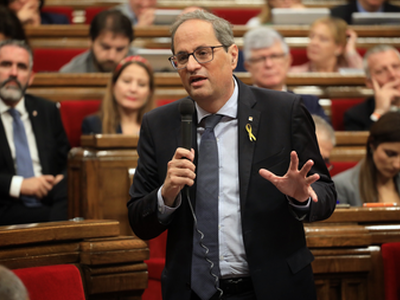- The president said that “pro-independence forces have always rejected violence, because it’s a peaceful, democratic, non-violent movement” and that “civil disobedience is a right, just like the right to protest and freedom of assembly”
- During the parliamentary control session, Torra said the Catalan government will tackle the challenges of the coming days on the basis of “steadfastness, calm, responsibility, determination, the vote and the word” and that “both police and citizens are aware of their rights and duties”

The president of the Government of Catalonia, Quim Torra, today called on the Parliament of Catalonia to “make a decision” and expressed the hope that it would be based on “the right to self-determination, democracy and human rights”. He said that any verdict other than acquittal would be very damaging to social harmony in Catalonia.
During the parliamentary control session, the head of the executive argued that the “constant threats to invoke Article 155” (i.e. to suspend Catalan self-rule) being made by most Spanish political parties should in no way alter the plans of the Catalan government. Torra stressed that the executive will tackle the challenges of the coming days on the basis of “steadfastness, calm, responsibility, determination” and, most importantly, “by never abandoning the approach that has given us the strength to reach this point – the only possible path: the vote and the word”. The president said this was the Catalan government’s “formula”.
According to Torra, if the Spanish state had accepted an agreed referendum, it would have been possible to avoid having “prisoners, exiles, repression and constant threats” and find out whether a majority of Catalan voters were in favour pursuing independence.
In reference to the way institutions and society will respond to the verdict in the referendum trial, the president reiterated his support for the Mossos d’Esquadra (Catalan police force), which he described as “a national, democratic police force committed to civic and human values”, whose work “makes it possible for citizens to live freely and securely”.
“Both the police and active, engaged citizens are very aware of their rights and duties at this time,” Torra said. “In this nation, everyone’s freedom and rights will be respected.” He contrasted this to the situation in Spain, where there are “two social leaders, Jordi Sànchez and Jordi Cuixart, in prison simply for having called on people to exercise their right to demonstrate and assemble”.
“Pro-independence forces have always rejected violence”
In response to a question from the Ciutadans (Citizens) parliamentary group, the president criticised the party for “banalising violence” and lamented that “we have to defend ourselves against a made-up narrative”. Torra said: “Pro-independence forces have always rejected violence because it’s a peaceful, democratic, non-violent movement.” He also noted that if protesters engage in civil disobedience, “that too is a right, just like the right to protest and freedom of assembly”. The president stressed that the main priority is to ensure that “the rights and freedoms of citizens are respected”.
In reference to a media protest against acts of aggression directed at some journalists, Torra said: “All members of this chamber agree that freedom of the press, freedom of information and freedom of expression must be respected and ensured.” He stressed that the government “condemns any attack that may have taken place against any reporter doing his or her job” and said this censure should apply to “any attack on any journalist”, regardless of the media organisation they work for.
